Below Elizabeth Falls, where it thunders out of Black Lake, the Fond du Lac du Nord relaxes. The river sprawls across a boulder-studded delta, braiding into pools and riffles and narrow chutes before losing velocity and spilling into a mile-wide bowl. The roar of whitewater becomes a murmur, the murmur a sigh. A tall, flat-topped esker, so perfectly and symmetrically formed that it might have been engineered by an ancient civilization, cradles this widening on the far side. The near shore is lower, a gradual rise through willows and alders to the lance-like crowns of spruce.
They stab the sky, a medieval army arrayed as if to repulse the arctic weathers. Where the shorelines come together, at the north end, the river regathers itself, quickening for the rush to Stony Rapids and on to Athabasca.
Middle Lake, this place is called. It sounds Tolkienesque, but it is not a fiction. If you look on a map of northern Saskatchewan and trace the Fond du Lac’s tortuous course you will find it, a tiny blue dot set apart, by a sliver’s width, from the massive horizontal swipe of Black Lake.
McClane fished there, Joe Brooks, others whose names were famous in their days. The journey was long and arduous—a day to Winnipeg; another day, hopscotching across the bush in progressively smaller aircraft, to camp—but it was made bearable by the prospect of what awaited: some of the world’s finest fishing for Arctic grayling, grayling not only of uncommon size, strength, and beauty but uncommonly inclined, hatch or no, to rise to dry flies.
I fished Middle Lake, once. Everything they said about it was true; some 40 years later, the evening I spent there still ranks as one of the most extraordinary
angling experiences of my life. It stands out so luminously I sometimes wonder if it really happened.
More Like This
That bright memory, though, is tangled with another, darker one. It is impossible to separate the two. At best, if I tug carefully and deliberately, I can tease a few discrete threads—images, sensations, emotions—from the knotted ball. But then it all bunches up again, and the memory of Middle Lake becomes hopelessly jumbled with the memory of the bear. We’d stumbled across it that very morning, enroute to the day’s pike fishing on the Cree River.
Our guides slaughtered it. We watched it die.
That morning it was overcast. A cool mist hung in the air, not falling so much as simply condensing, like breath on glass. My father, Harlan, was my fishing partner; our guide, Moise, was a stolid Chipewyan who, in the absence of a direct question, might go an hour without uttering a word. We rounded a reed-stippled point and saw, in one of the Cree’s many lake-like widenings, another boat from the same camp. It was circling something in the water, something moving, swimming, alive.
A bear.
Coming closer, we could make out the broad dome of its skull, the tan, doglike muzzle, the erect, almost cartoonish ears. The occupants of the other boat, a pair of jowly pensioners from Duluth named Bill and Clarence, were busily snapping away with their Instamatics; their guide, a lean, self-satisfied Chipewyan who was Moise’s polar opposite—the Wolf, I’ll call him—stood in the stern with the outboard’s tiller in his hand, hazing the bear, keeping it in open water. It did not appear especially large as black bears go, but it was large enough.
As our boat came alongside, the two guides began to converse excitedly. Even the stoic Moise was unusually animated. I thought nothing of it, at first. But then something in their tone brought me up short, and I realized, with a kind of awful, epiphanic clarity, that this was not merely a photo opportunity for us “sports,” like easing up to a loon carrying its chicks on its back. The guides saw the bear as a windfall. The old imperatives—atavistic, tribal—were still in force.
I turned to Dad and said, “They’re going to kill it.”
The Wolf did most of the talking, and his stabbing gestures revealed the plan: He would fashion a spear.
A copse of skeletal dead spruces stippled the muskeg at the edge of a shallow bay, and while the Wolf searched for one he could lash his hunting knife to Moise took over the task of guarding the bear. It’s tempting to anthropomorphize, to say that I read panic and confusion in the bear’s behavior, that I saw terror in its eyes. But I did not. As if its stamina was bottomless, its patience infinite, the bear simply kept swimming, always pressing for the shore. There was nothing else it could do.
The Wolf returned, brandishing his makeshift spear like a Masai warrior. There was no more conversation. Moise kept the bear pinned between our boat and theirs, and the Wolf stood and struck, again and again, seeking to drive the blade between the bear’s ribs, into its lungs. The spear was long and unwieldy; nor was the Wolf, for all his bravado, good with it. Most of his blows glanced off bone or missed entirely, the blade slashing futilely at the water. But enough struck home—and one went deep, extracting an anguished, bellowing groan, a sound that issued from a place that is all darkness, all black.
It was the only time the bear cried out.
I can hear it, still. And I can see the Wolf as he thrust his spear, his eyes ablaze, his face contorted with a kind of lascivious fury. It was a scene of primal, primitive savagery; it seemed like something out of a corrupted Moby Dick, with the inept, half-crazed Wolf in the role of Queequeg, the aboriginal harpooner who prided himself on his lethal professionalism.
Finally and mercifully, as the knife sank one more time inside the bear, the fatigued metal snapped at the helve. The Wolf stared mutely for a moment; then, laughing like a hyena, he flung the useless shaft into the water. But the mortal damage had been done. Now—and this was the most horrifying part—we simply waited for the bear to die. We waited while its life leaked away, its blood mingling with the currents of the Cree River, this artery surging through the wilderness of northern Saskatchewan.
The guides positioned the boats directly opposite one another, orbiting the bear in counter-clockwise circles like partners in a slow, sad waltz, a valse triste. The bear swam in circles also, a trickle of bright-red blood bubbling from its wounds.
Gradually and incrementally—how long it took I cannot say—the bear weakened. Its breath came in rattling gasps; its strokes, which had been so impressively strong, faltered. The circles tightened, the orbit decayed. It felt like the descent into madness, or hell, Yet still the bear did not cry out.
And then it was over. Moise secured a line to one leg, and we towed the bear to shore. It proved to be a young boar, three or perhaps four years old. We guessed its weight at around 200 pounds. The guides dragged it to a clearing in the bush where, working briskly and efficiently—like whalers with their flensing knives—they skinned, gutted, and quartered it. The flesh was the color of old burgundy, a dark, purple-red. They scraped out a shallow grave beneath a canopy of firs, interred the meat and hide in the cool earth, and covered it first with moss, then with logs and stones.
“Come back tonight,” Moise explained in his halting English. “Bring our rifles.”
This puzzled us at first, but then its meaning became clear: They had to maintain appearances. They had to make it look as if they’d harvested the bear during a legal, legitimate hunt, a hunt that had taken place on their own time.
This was confirmed later in the day when, reeling up for the long boat ride back to camp, Moise made what, for him, amounted to a speech. “Don’t say about bear at lodge, OK?” he asked, smiling weakly. “Could lose guide license.”
That evening, after dinner, we squeezed into the cab of a stripped-down flatbed truck and made the 20-minute drive to Middle Lake, jolting down a stone- and stump-littered two-track hacked out of the bush. The road led to a spruce-ringed cove about a quarter-mile downstream from the falls, where the current slows and reeds bend languorously at its edges. An aluminum boat was cached there, pulled up on shore.
“This is big pike country,” our guide, a white named Eric, said as the outboard coughed and caught. “They hang out below the fast water, feeding on grayling. Tom McNally caught a 28-pounder here a few years ago.”
It was a gorgeous evening, almost warm, the scattered cottony clouds glowing like mother-of-pearl in the protracted northern twilight. A flock of scoters paddled up across the lake, lugging their heavy bodies low against the steep-walled esker. Eric threaded the boat upstream, found a pocket of quiet water, and set the anchor. The roar of the falls was deafening; you felt it as much as heard it, reverberating in the hollow beneath your breastbone like the thump of a kettledrum.
We took several small fish on buoyant Wulffs and Humpies, the herring-sized grayling smacking our flies with such abandon that they sometimes came completely out of the water. We tried a few other spots in the faster water with similar results, then Eric dropped the boat to a place where the water was deeper and less broken, a pool with a dark, Sophoclean clarity. I switched to a standard Adams—there was no discernible hatch—wiggled some slack into my cast, and landed the fly in a seam that flowed as black and slick as oil.
The Adams disappeared in a boiling rise, and I was fast to a fish that bent the rod to the corks before making a series of those graceful, arching leaps its tribe is famous for. Changing tactics after its aerial display, it stayed down, pulling hard and using the heavy current to its advantage, putting the lie to the conventional wisdom that the Arctic grayling is all show, a flashy fighter that starts fast but tires quickly. This fish battled with the conviction and resolve of a smallmouth bass, and when Eric finally slipped the net under it I gasped at its size.
“About three pounds,” he said, matter-of-factly. “Maybe a little more.”
Its beauty staggered me. The grayling was midnight blue, almost black, but with a subtle, shimmering iridescence that gave it a holographic quality. The skin seemed to have depth, as if another dimension, another universe, lay just beneath the surface, visible but forever out of reach. A band of neon-bright fuchsia tipped its sail-like dorsal fin, which in turn was daubed with pink spots, stretched and elongated like the bubbles in a lava lamp.
But there was something else. When I held the grayling for a picture, it vibrated like a plucked string. My hands tingled; I had the sensation that I’d come into contact with an electric current. Of all the fish I’ve handled in my life, only the grayling of Middle Lake felt like this—so palpably alive, so perfectly embodying their environment, the very water incarnated and made flesh.
I lost count of the grayling I took from that pool. The supply seemed inexhaustible. None of the fish were small; all of them fought with astonishing energy. It was everything I’d dreamed “wilderness fishing” would be.
It was almost enough to make me forget about the bear.
And in fact I did forget, the whole of my consciousness focused on the grayling, until Eric piped up. “I was talking to Bill and Clarence at dinner,” he said. “They mentioned that you saw a bear this morning, down on the Cree.”
Nothing in his tone suggested it was anything but an offhand remark, an interesting tidbit to flavor the conversation. Dad and I exchanged the briefest of glances, just making eye contact, and I said, “Yeah, we did. It was swimming across one of those wide spots. Moise said that he and the other guide might go back and hunt it.”
“Huh,” Eric snorted. “I wonder how they think they’re going to do that. It’d be a miracle if they saw it again, in this country.”
“I don’t know,” I shrugged, working out line for another cast.
I never returned to that camp, although I heard that they stopped making their guests take the long, punishing boat ride to the Cree River. Instead, they sent the guides ahead and flew the sports there in floatplanes. But they were merely forestalling the inevitable. The camp has been abandoned now for decades, its buildings ruins in the bush, its stories lost on the keening winds.
Except for this story, which I have carried for forty years, searching for the words to tell, the words that would help me find the way back to Middle Lake.

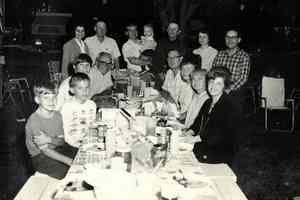

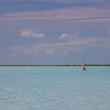
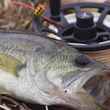
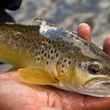
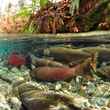




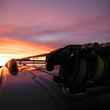


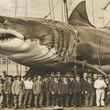
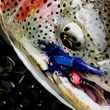
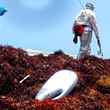




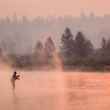



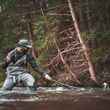
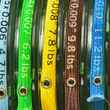
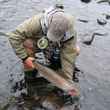

Comments